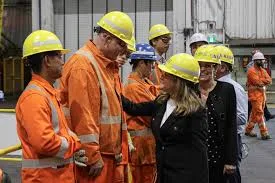Ottawa – Workers are at the heart of Canada’s economy. For our economy and for every generation to reach their full potential, Canadian workers need good-paying jobs. We’re doing this by making investments that increase productivity, boost innovation, and accelerate the flow of capital into Canada. And we’re doing everything we can to protect Canadian workers from unfair competition.
Chrystia Freeland, Deputy Prime Minister and Minister of Finance, alongside Randy Boissonnault, Minister of Employment, Workforce Development and Official Languages, and Jean-Yves Duclos, Minister of Public Services and Procurement and Quebec Lieutenant, announced further action to protect and create jobs for Canadian workers.
First, the Deputy Prime Minister and Minister of Finance announced that effective today, imports of certain Chinese-made steel and aluminum products are subject to a 25 per cent tariff. These tariffs will help level the playing field to protect Canadian workers whose job security is being put at risk by China’s unfair, intentional, and state-directed trade practices of oversupply and overcapacity, as well as its lack of robust environmental and labour standards. Through this action in lockstep with key trading partners, Canada is also preventing trade diversion with these tariffs.
Recognizing that Canadian businesses may need time to adjust, the federal government is prepared to offer tariff relief in certain, exceptional circumstances to help make sure that Canadian workers aren’t punished as new supply chains are established. Canadian businesses can apply for relief by emailing remissions-remises@fin.gc.ca. Requests received before November 8, 2024, will be processed on a priority basis.
Second, the Minister of Employment, Workforce Development and Officials Languages announced further robust reforms to the Temporary Foreign Worker Program to ensure the labour market is fair for Canadian workers. Some employers are using the Temporary Foreign Worker Program to hire from abroad at lower wages than what they would pay Canadians. This undercuts Canadians’ wage growth and the number of available jobs, puts temporary foreign workers into precarious situations, and erodes confidence in our immigration system.
To protect Canadian workers from unfair wage competition, starting November 8, 2024, the hourly wage criteria for the high-wage stream will be raised to 20 per cent above the median hourly wage—between $5 per hour and $8 per hour—depending on the province or territory. This will incentivize employers to hire Canadians before turning to the program and encourage greater wage growth. And to crack down on employers who provide false information on their applications, starting October 28, 2024, the government is implementing stringent new data verification processes, which will ensure only genuine and legitimate job offers are approved.
Third, the Ministers launched new measures to secure Canada’s artificial intelligence (AI) advantage, including the $200 million Regional Artificial Intelligence Initiative. AI is already unlocking growth and job opportunities in industries across the economy and helping many Canadian workers become more productive. In the past year, job growth in AI increased by nearly one third in Canada—among the highest growth of any sector. And most AI jobs pay well above the average income.
Today, the government is launching two key parts of its $2.4 billion AI package to ensure the economic benefits of AI reach all corners of our country. Through the new $200 million Regional Artificial Intelligence Initiative, Canada’s Regional Development Agencies will support AI start-ups to bring new technologies to market, and drive AI adoption by small businesses in critical sectors across the economy, such as agriculture, clean technology, health care, and manufacturing. In addition, the National Research Council of Canada Industrial Research Assistance Program is receiving $100 million to help small- and medium-sized businesses scale up and increase productivity by building and deploying new AI solutions.
The federal government’s economic plan is taking action to protect and create good-paying jobs for Canadian workers. We are protecting workers from unfair Chinese competition and from having their wages undercut. And we are investing in the technologies that create good-paying jobs, accelerate innovation, and boost productivity, so workers can focus on what they do best. This is all part of our plan to raise wages, increase living standards, and build a Canada that’s fairer for every generation.
“Protecting and creating jobs for Canadian workers, and helping them earn higher wages, are at the heart of our economic plan. Our focus on fairness for Canadian workers is why we’re investing to create more good-paying jobs, accelerate innovation, and level the playing field. As we grow our economy, we’re helping Canadian businesses overcome the challenges they face, so they can scale up, hire more talented workers, and keep innovating for generations to come.” – Chrystia Freeland, Deputy Prime Minister and Minister of Finance
“This change to the Temporary Foreign Worker Program reinforces our commitment to protecting temporary foreign workers, while prioritizing the Canadian workers available to join the labour force. By raising the threshold for high-wage stream positions, we are supporting wage growth for Canadians.” – Randy Boissonnault, Minister of Employment, Workforce Development and Official Languages
“Today’s announcement is yet another example of how the federal government is investing in good-paying jobs in Quebec and across Canada all while protecting workers from unfair trade practices from China and employers who are abusing the system. The federal government is also building the Canadian economy of the future through investing in artificial intelligence (AI). By fostering innovation, we are creating good-paying jobs, and economic growth in Quebec and throughout the country.” – Jean-Yves Duclos, Minister of Public Services and Procurement and Quebec Lieutenant








